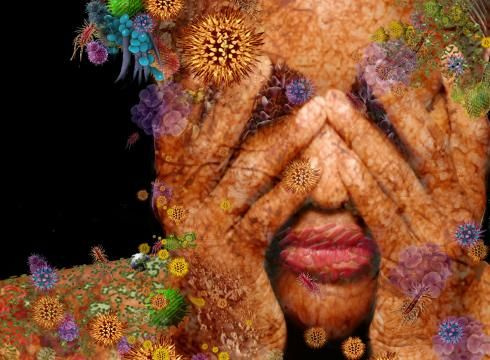Bacteria, an inevitable part of ... humanity
As we know, animals are home to countless microorganisms.Scientists have discovered that some of these tiny 'clingers' are capable of causing people to be seriously ill, while others play an essential role in maintaining the dynamic system - the average plant usually inside our bodies.
And there are many interesting things about them that you may not know .
The human body contains more microorganisms than cells
The human body is full of germs. Some researchers say that inside your body, the number of bacterial cells is 10 times greater than the total number of human cells.'The exact number is not important. It is interesting to note that the bacterial cells in our bodies are more likely than human cells , " said microbiologist Martin Blaser of New York University School of Medicine.

The human body is full of microorganisms. (Artwork: Scitech.com)
As humans evolved, these bacteria also evolved with us. Many viruses also call the human body 'home'.
People are born without bacteria
Because there are so many bacteria living inside the human body, there is a view that they have been there since we were born. However, the truth is not so. According to Blaser experts, when born, the human body does not contain bacteria and only gradually "has" them in the first few years of life.
Children receive the first batch of bacteria when they pass through the mother's birth canal (for women who give birth normally). Of course, caesarean babies don't receive microorganisms in this way. In fact, studies show that children who have a caesarean section have a very different microbial system than normal babies and may face a higher risk of getting certain types of allergies and obesity.
According to Mr. Blaser, a child acquires the majority of its microbiota at age 3, the time of metabolism, the child's immune, cognitive and reproductive systems are going through the process. expanded development.
Bacteria are both beneficial and harmful to people
Researchers have shown that, while some bacteria can make you sick, others play an important role in maintaining your health and helping you fight infection. Sometimes, the same bacteria can produce both effects.
Take the case of Helicobacter pylori, a bacteria that causes stomach ulcers. This bacterium was found in most people on Earth, but their popularity has gradually decreased and only about half of the world's population currently contains them. Most of these bacteria do not cause symptoms, but a small number of them develop into painful ulcers in the acidic part of the gastrointestinal tract (a discovery was awarded the 2005 Nobel Prize in Medicine).

Bacteria are both beneficial and harmful to humans. (Photo: My Health News)
The infections caused by Helicobacter can be treated with antibiotics, but Blaser and his colleagues found that the absence of this bacterium seems to be related to the occurrence of esophageal diseases, such as Reflux esophagitis and some esophageal cancers. Although not all scientists agree with this view, 'there is evidence that Helicobacter is both beneficial and biologically harmful,' Blaser said.
Antibiotics can cause asthma and obesity
Penicillin was an important breakthrough when Alexander Fleming discovered it in 1928. Antibiotics have been popular since then, but the abuse of antibiotics has led to an increase in antibiotic resistant bacteria strains. people, such as Methicillin-resistant Staphylococcus aureus (MRSA).
Currently, researchers have obtained some evidence that antibiotics also increase the risk of asthma, enteritis and obesity.
Of course, there are times when antibiotics are unforeseen, especially for a child who is very sick. However, Blaser researcher insists, many common diseases in children, such as ear infections or throat infections, will disappear on their own.
The use of probiotic preparations is exaggerated
The recognition of bacteria may be useful to humans, leading to a fever of probiotic supplements, including live bacteria that are thought to bring many health benefits. Many people use them after a series of antibiotics. But are they really useful?
"The concept of beneficial bacteria to help restore the basic microorganism after taking antibiotics is right. But the idea is that, out of thousands of microorganisms in our bodies, only one species is used. The extract of cow or butter is too naive , 'said Blaser, who says the current probiotic preparations are advertised too well but in fact do not bring much benefit. someday it will develop useful probiotic products for the treatment of illness, but for the time being 'still a very young field'.
- Bacteria that eat oil have been discovered in the deepest part of the ocean
- New bacteria in the nostrils will lead humanity through the era of antibiotic resistance
- Find out the oldest infectious bacteria of humanity
- The most toxic and strange forms of bacteria on the planet
- Challenging the aging process
- Check out the types of polar bacteria that are beneficial to humans
- Nitrogen fixation: relationship between plants and bacteria (Part 2)
- Antibiotic-resistant bacteria: Do the old
- No matter how cold the weather is, the part is not cold or frozen
- Forget sharks, these 5 bacteria also make you
- Bio-nano robot will help end the antibiotic resistance crisis
- 10 'dying' rivers of America (Part 1)
 Why do potatoes have eyes?
Why do potatoes have eyes? 'Tragedy' the world's largest carnivorous life: Death becomes ... public toilet
'Tragedy' the world's largest carnivorous life: Death becomes ... public toilet Tomatoes were once considered 'poisonous' for 200 years
Tomatoes were once considered 'poisonous' for 200 years Detecting microscopic parasites on human face
Detecting microscopic parasites on human face